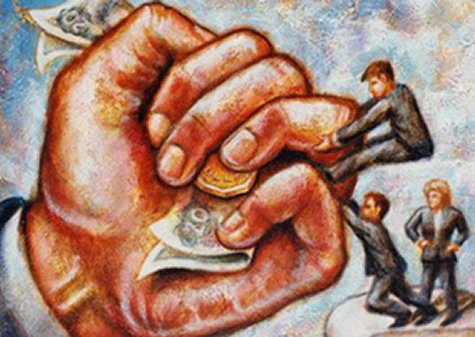« Obama Agenda Destory America's Economy With His "Stimulus" Bill and Bailouts Costing Over $5 Trillion!! | Main | General Faces Unease Among His Own Troops, Too »
June 28, 2010
Financial De-form

Financial Deform
Regulation: The financial reform bill that's about to be passed is reform in name only. It does little to correct the problems that led to our meltdown, and may do more harm by giving people a false sense of security.
The media have called this "compromise" legislation the most sweeping change in U.S. financial regulation since the 1930s. Which is saying a lot.
The two sponsors, Rep. Barney Frank and Sen. Chris Dodd, are as much responsible for the financial crisis as any two people in America. Yet, we're now supposed to believe that they, and their flailing party, which can't even meet its legal obligation to produce a budget, have now fixed our financial system.
President Obama crowed about it in the press, and planned to use the bill as leverage in negotiations with his European counterparts at the G-20 meeting. Obama hopes to sign the bill by July 4.
Before you get too excited, you should know the "compromise" in Dodd-Frank isn't between Republicans and Democrats, but between Democrats and Democrats. In short, it's the left's idea of how to regulate Wall Street. And while some things in the bill aren't bad, most of it is.
We won't go into everything the bill would do, since the 2,000-page tome can't be distilled into a few easy-to-digest bullet points. But what we can tell you is what it doesn't do, which is plenty. In fact, the bill fails to address any of the key issues raised by the 2007-08 market meltdown, while imposing onerous new restrictions on both banks and consumers.
For instance: Fannie Mae and Freddie Mac, which were inarguably at the heart of the financial crisis, and which have already cost U.S. taxpayers $146 billion (with hundreds of billions more on the way), aren't addressed in this bill at all.
This is insane, given the role these two government-sponsored enterprises played both in encouraging lending to poor, unqualified homebuyers and repackaging those securitized loans for resale to banks and investors around the world.
Worse, the bill does nothing to amend the "too-big-to-fail" doctrine that has guided U.S. banking policy for decades. Any bank that runs into trouble can still walk up to Uncle Sam's borrowing window and, hand outstretched, ask for money. And if the bank is politically connected or very large, it will get it.
This puts every small bank, investor or lender at a huge disadvantage, since they're most certainly not "too big to fail." This is a big reason why the biggest U.S. banks didn't squawk too much about the legislation. As bad as it is, it gives them a competitive edge.
The bill also gives federal regulators sweeping new powers to seize and break up financial firms. Good idea, you say? Remember: The government also gets to decide what is a "financial" firm. Does GM, which makes loans, fall into that category? How about Wal-Mart, which issues its own credit cards?
In effect, this lets the government seize and dismantle the assets of almost any company — and then force others to pay for it.
The bill also creates a new agency inside the Federal Reserve that will have extensive power over consumer lenders. Hold the applause, because likely new limits on checking account fees and interest on credit cards will mean less access to credit, not more.
Another part of the bill, and one that's gotten little attention, makes changes to the amount of capital banks must keep to back up their loans. Banks eventually will be forced to raise more capital, or to reduce their lending. It also gives the government oversight over the $600 trillion derivatives market, without telling us what the rules will be. That, no doubt, will be left to bureaucrats.
We've just scratched the surface here. We'll have more to say in coming weeks as we plow through this monster of a bill that appears to reform little but harm a lot.
.
Lawmakers guide Dodd-Frank bill for Wall Street reform into homestretch
Nearly two years after tremors on Wall Street set off a historic economic downturn, congressional leaders greenlighted a bill early Friday that would leave the financial industry largely intact but facing a more powerful network of regulators who could impose limits on risky activities.
The final bill took shape after a 20-hour marathon negotiation between House and Senate leaders seeking to reconcile their separate versions. The legislation puts a lot of faith in the watchful eye of regulators to prevent another financial crisis. New agencies would police consumer lending, the invention of financial products and the trading of exotic securities known as derivatives. Bank supervisors would have the power to seize large, troubled financial firms whose collapse could threaten the entire system. The bill calls for banks to hold more money in reserve to weather economic storms but leaves the details to regulators.
The House and Senate are set to vote on the legislation next week, and administration officials said President Obama could sign it into law before July 4.
(snipet)
The bill's final passage would set off a rush of activity. Two long-standing bank regulators would be combined, and regulators would have to launch more than 20 studies on controversial topics such as limiting the risky activities of big financial firms and setting precise capital reserve standards for banks.
Some administration officials acknowledged that leaving so much decision-making in the hands of regulators could open the process to lobbying by the financial industry. Many bank supervisors, in fact, work inside the headquarters of the biggest financial firms and have close relationships with the executives of the companies they regulate.
Among the first tasks for the administration would be to set up a new consumer protection bureau that would monitor credit card companies, mortgage brokers and banks to make sure consumers have clear information about financial products.
The new agency, while housed in the Federal Reserve, would have its own budget and director appointed by the president and would have wide authority to write consumer protection rules and enforce them with civil penalties. It could, for instance, force mortgage lenders to be more upfront about possible interest increases in adjustable-rate loans. During the crisis, many borrowers were caught off guard by the rise in rates on such loans.
(snipet)
"It's a great moment. I'm proud to have been here," said a teary-eyed Sen. Christopher J. Dodd (D-Conn.), who as chairman of the Senate Banking Committee led the effort in the Senate. "No one will know until this is actually in place how it works. But we believe we've done something that has been needed for a long time. It took a crisis to bring us to the point where we could actually get this job done."

Wild Thing's comment........
Kiss individual freedom good-bye and kiss capitalism good-bye.
Soros has been pushing this, wants more global controls on US and our economy.
Look at this that Chris Dodd said sheesh! ......"“It’s a great moment. I’m proud to have been here,” said a teary-eyed Sen. Christopher J. Dodd (D-Conn.), who as chairman of the Senate Banking Committee led the effort in the Senate. “No one will know until this is actually in place how it works. But we believe we’ve done something that has been needed for a long time. It took a crisis to bring us to the point where we could actually get this job done.”
 .... Thank you Jim for sending this to me.
.... Thank you Jim for sending this to me.
.
 ....Thank you Mark for sending this to me.
....Thank you Mark for sending this to me.
Mark
3rd Mar.Div. 1st Battalion 9th Marine Regiment
1/9 Marines aka The Walking Dead
VN 66-67
Posted by Wild Thing at June 28, 2010 05:48 AM
Comments
All these regulations. Imperfect people in charge of other imperfect people with total control over the Banks and Wall Street. Where do these dimwhits get the idea there nitwits are any smarter that the ones they are suppose to regulate.
Everytime the government gets involved the cost of goods and services goes up. And we the consumer pays the freight for "our own good" what a crock of crap. obama wants to tax the Banks, then what, Banking services will rise accordingly for loans checking you name it the Bank will pass the cost off on to the customer.
So what's been achieved, more taxes upon taxes have been heeped on the Taxpayer.
Posted by: Mark at June 28, 2010 08:54 AM
News station out of Kansas City interviewed some small locally owned banks in the area. With the passage of this legislation, many of them will either go under or have to charge for previously free services like checking and on-line banking. What's going to happen is that there is only going to be large national type banks, like BOA, left.
Posted by: BobF at June 28, 2010 09:54 AM
Another 2000 page law that "no one knows how it will work". Actually it is another big step in govt. control of our economic lives. Marxism at work here Folks. Oh yeah, another massive hiring of more Federal employees.
Posted by: TomR, armed in Texas at June 28, 2010 10:25 AM
As the government grabs more control, more things need to be controlled. So there is an ever expanding circle of regulation. Until, eventually, we're serfs.
Posted by: Jim at June 28, 2010 08:33 PM
